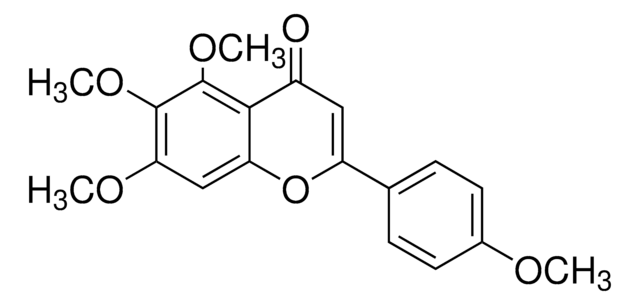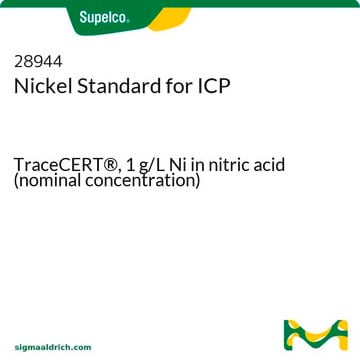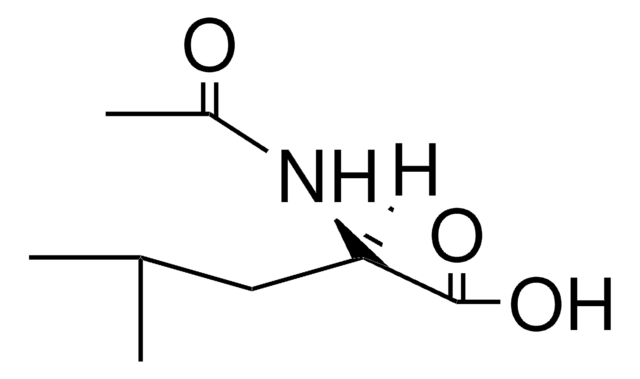All Photos(2)
About This Item
Linear Formula:
C10H6(CH3)2
CAS Number:
Molecular Weight:
156.22
Beilstein:
2039376
EC Number:
MDL number:
UNSPSC Code:
41116107
PubChem Substance ID:
Recommended Products
grade
analytical standard
shelf life
limited shelf life, expiry date on the label
technique(s)
HPLC: suitable
gas chromatography (GC): suitable
refractive index
n20/D 1.615 (lit.)
bp
266-267 °C (lit.)
mp
−2-−1 °C (lit.)
density
1.013 g/mL at 25 °C (lit.)
application(s)
environmental
format
neat
SMILES string
Cc1ccc2ccccc2c1C
InChI
1S/C12H12/c1-9-7-8-11-5-3-4-6-12(11)10(9)2/h3-8H,1-2H3
InChI key
QNLZIZAQLLYXTC-UHFFFAOYSA-N
Looking for similar products? Visit Product Comparison Guide
General description
1,2-Dimethylnaphthalene belongs to the family of polycyclic aromatic hydrocarbons (PAHs), which are of industrial relevance. PAHs are considered as common environmental contaminants and can adversely affect human health.
Application
1,2-Dimethylnaphthalene may be used as an analytical standard for the determination of the analyte in biota samples, Patinopectin yessoensis species of scallops, sediments and petroleum products by various chromatography techniques.
Refer to the product′s Certificate of Analysis for more information on a suitable instrument technique. Contact Technical Service for further support.
Recommended products
Find a digital Reference Material for this product available on our online platform ChemisTwin® for NMR. You can use this digital equivalent on ChemisTwin® for your sample identity confirmation and compound quantification (with digital external standard). An NMR spectrum of this substance can be viewed and an online comparison against your sample can be performed with a few mouseclicks. Learn more here and start your free trial.
Storage Class Code
10 - Combustible liquids
WGK
WGK 3
Flash Point(F)
235.4 °F - closed cup
Flash Point(C)
113 °C - closed cup
Personal Protective Equipment
dust mask type N95 (US), Eyeshields, Gloves
Choose from one of the most recent versions:
Already Own This Product?
Find documentation for the products that you have recently purchased in the Document Library.
Temperature requirements for thermal modulation in comprehensive two-dimensional gas chromatography.
Richard B Gaines et al.
Journal of separation science, 27(5-6), 380-388 (2004-09-01)
Temperature requirements for trapping and release of compounds in a cryogenic gas loop-type GC x GC modulator were determined. Maximum trapping temperatures on the uncoated, deactivated modulator capillary were determined for compounds from C4 (bp -0.5 degrees C) to C40
V Fernández-González et al.
Journal of chromatography. A, 1207(1-2), 136-145 (2008-09-02)
This paper presents the development of a programmed temperature vaporization-gas chromatography-tandem mass spectrometry (PTV-GC-MS-MS) method for the determination of PAHs in complex environmental matrices. This method aims at overcoming the current problems in detecting these compounds in matrices such as
Enric Saiz et al.
Environmental pollution (Barking, Essex : 1987), 157(4), 1219-1226 (2009-01-17)
Short-term (24h) exposure experiments have been conducted to determine the effects of two environmental relevant polycyclic aromatic hydrocarbons (PAHs), naphthalene (NAPH) and dimethylnaphthalene (C2-NAPH), on the naupliar and adult stages of the marine cyclopoid copepod Oithona davisae. To resemble more
A Kilanowicz et al.
International journal of occupational medicine and environmental health, 11(4), 305-317 (1999-02-24)
The aim of this study was to investigate the distribution, excretion and metabolism of 1,2-dimethylnaphthalene-[ring-U-3H] in rats. The experiments were performed on 54 male outbred IMP:Wist rats with body weight of 200 g +/- 20%. The compound was given i.p.
Analysis of volatile components in frozen and dried scallops (Patinopecten yessoensis) by gas chromatography/mass spectrometry
Chung HY, et al.
Food Research International, 35(1), 43-53 (2002)
Our team of scientists has experience in all areas of research including Life Science, Material Science, Chemical Synthesis, Chromatography, Analytical and many others.
Contact Technical Service








